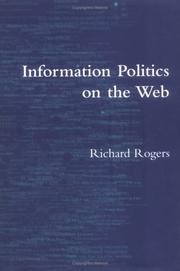| Listing 1 - 1 of 1 |
Sort by
|

ISBN: 9786612096716 1282096710 0262256878 1423796586 9780262256872 0262182424 9780262182423 9780262681643 0262681641 6612096713 9781282096714 9781423796589 Year: 2004 Publisher: Cambridge, Mass. : MIT Press,
Abstract | Keywords | Export | Availability | Bookmark
 Loading...
Loading...Choose an application
- Reference Manager
- EndNote
- RefWorks (Direct export to RefWorks)
Does the information on the Web offer many alternative accounts of reality, or does it subtly align with an official version? In Information Politics on the Web, Richard Rogers identifies the cultures, techniques, and devices that rank and recommend information on the Web, analyzing not only the political content of Web sites but the politics built into the Web's infrastructure. Addressing the larger question of what the Web is for, Rogers argues that the Web is still the best arena for unsettling the official and challenging the familiar.Rogers describes the politics at work on the Web as either back-end--the politics of search engine technology--or front-end--the diversity, inclusivity, and relative prominence of sites publicly accessible on the Web. To analyze this, he developed four "political instruments," or software tools that gather information about the Web by capturing dynamic linking practices, attention cycles for issues, and changing political party commitments. On the basis of his findings on how information politics works, Rogers argues that the Web should be, and can be, a "collision space" for official and unofficial accounts of reality. (One chapter, "The Viagra Files" offers an entertaining analysis of official and unofficial claims for the health benefits of Viagra.) The distinctiveness of the Web as a medium lies partly in the peculiar practices that grant different statuses to information sources. The tools developed by Rogers capture these practices and contribute to the development of a new information politics that takes into account and draws from the competition between the official, the non-governmental, and the underground.
Information technology --- Web search engines --- Web portals --- Civil society. --- Knowledge, Sociology of. --- Social aspects. --- Political aspects. --- Knowledge, Theory of (Sociology) --- Sociology of knowledge --- Gateways (Web portals) --- Internet portals --- Portals (World Wide Web) --- Web searching --- World Wide Web searching --- Communication --- Knowledge, Theory of --- Public opinion --- Sociology --- Social epistemology --- Social contract --- Web sites --- Federated searching --- Internet searching --- Search engines --- World Wide Web --- Subject access --- Selective dissemination of information. --- Technologie de l'information --- Moteurs de recherche sur Internet --- Portails (Informatique) --- Diffusion sélective de l'information --- Sociologie de la connaissance --- Aspect social --- Aspect politique --- INFORMATION SCIENCE/Internet Studies --- INFORMATION SCIENCE/Technology & Policy
| Listing 1 - 1 of 1 |
Sort by
|

 Search
Search Feedback
Feedback About
About Help
Help News
News